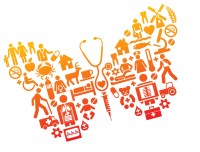Looking after you locally
Norfolk Community Health and Care NHS Trust
www.norfolkcommunityhealthandcare.nhs.uk
Diabetes Awareness Week: June 9-15 2013
People in Norfolk are being encouraged to consider their risk of developing diabetes and to accept the offer of a quick and easy test.
Around 31,000 people in Norfolk have diabetes, with around 2,300 more people diagnosed locally each year. There are two main types of diabetes, with people tending to be at heightened risk of Type Two (more below) if they are: over 40 years; overweight; have high blood pressure; or have had a heart attack or a stroke.
During national Diabetes Awareness Week, which will be held June 9-15, specialist diabetes nurses from Norfolk Community Health and Care NHS Trust (NCH&C) are aiming to make information and testing as accessible as possible.
They will be on hand at Tesco supermarket, in King’s Lynn, on June 14 and 15. As well as offering information about diabetes, they will also be providing people with on-the-spot finger-prick tests, which can help to diagnose diabetes.
Julie Widdowson, NCH&C’s Diabetes Educator and Practitioner said: “It is essential that people come forward to be diagnosed as soon as possible and that they access our help to best manage their condition. We can help people to manage their symptoms through the right medication, diet and exercise.
“The early signs of diabetes can include an increased thirst, extreme tiredness, blurred vision, and the slow healing of wounds.
“Unfortunately, some people don’t spot the symptoms of diabetes for some time, which may cause a delay in them accessing expert support and care.
“It is essential that people speak to their GP if they are concerned they may have the symptoms of diabetes, so clinicians can provide interventions as soon as possible.”
There are two main types of diabetes:
Type 1 diabetes develops when the body’s immune system attacks and destroys the cells that produce insulin. Type 1 diabetes is less common than Type 2, making up around 10% of all diabetes cases nationally. It is usually diagnosed before the age of forty, with people likely to need insulin treatment for life.
Type 2 diabetes develops when the body does not produce enough insulin to maintain a normal blood glucose level, or when the body is unable to effectively use the insulin that is being produced. Type 2 diabetes accounts for around 90 percent of people with diabetes and is often linked with other conditions, such as obesity or high cholesterol.
Diabetes makes it hard for people’s bodies to control the level of glucose in their blood. Uncontrolled hyperglycaemia (high blood glucose) puts the patient at increased risk of cardiovascular problems, such as strokes and heart attacks. It can also damage small blood vessels, affecting the function of the eyes and kidneys, as well as the feet, which could lead to foot amputation.
You can find out more about diabetes at NCH&C’s website: www.norfolkcommunityhealthandcare.nhs.uk/The-care-we-offer/Conditions-finder/diabetes.htm
People who are concerned that they may have diabetes should speak to their GP.










